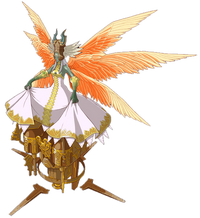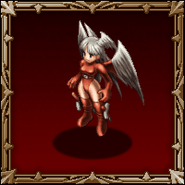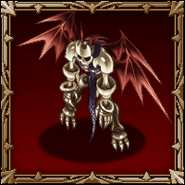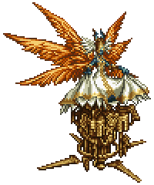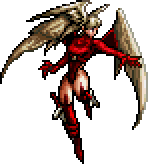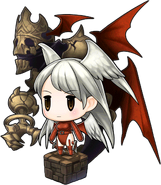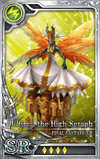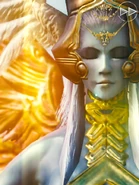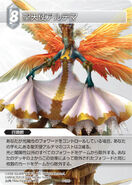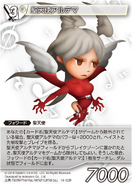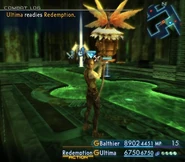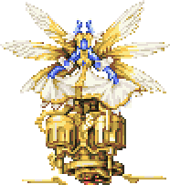Template:Sideicon
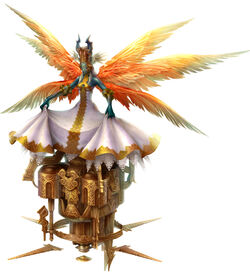
Ultima in Final Fantasy XII.
Masterpiece among the scions created by the gods, and the mastermind of the plot to rise against them. Prior to her betrayal, she was tasked with guiding souls to heaven and aiding in their reincarnation. Called the High Seraph for her angelic wings of glimmering gold, yet it was on wings of deepest black that the tainted angel Ultima rose against the gods. Since her fall, her heart is without light, and impossible to know.
Clan Primer Bio
Ultima, the High Seraph (聖天使アルテマ, Seitenshi Arutema?, lit. Ultima, the Holy Angel) is a recurring summon and entity in Ivalice. She is associated with the Holy element, her color sign is golden yellow, and she represents the zodiac sign of Virgo, the Virgin. While she debuted in Final Fantasy Tactics, her most prominent design is based on her look in Final Fantasy Tactics Advance.
Appearances
Final Fantasy XII
Ultima is an optional Esper located at the top of the Great Crystal in Giruvegan. Considering how big the Great Crystal is, and that only chosen people can use the waystones, Ultima seems to have been stored in a place where the Occuria can easily keep track of her.
Defeating Ultima rewards her icon in the Sky Pirate's Den in the Clan Primer, earning the player the title of "Fell Angel".
Final Fantasy XII: Revenant Wings
High Seraph, bringer of life and death.
In-game Description
Ultima is the Rank III magical Holy Yarhi. To summon her on the Ring of Pacts, Shiva or Ramuh must be unlocked first. Her position on the Ring is the farthest spot from Zalera, the Death Seraph. Ultima is fought in Mission 57: Otherworldly Beauty, which takes place at the Underfane of Huin Qul. Defeating her gains Penelo her Quickening, Dance of Rapture.
- Revitalize - restores HP and removes debuffs from one character.
- Eschaton (Perfect Ultima) - deals Holy damage to a group of enemies in a straight line extending from Ultima.
Final Fantasy XIV
Ultima is the final boss of the Orbonne Monastery 24-player raid. She resembles a fusion of her Final Fantasy XII appearance and her second form from Final Fantasy Tactics.
Final Fantasy Tactics
Ultima (also known as Altima, the Bloody Angel), is the final boss and the leader of the Lucavi whom the other Lucavi wish to revive.
Final Fantasy Tactics Advance
Ultima is a Totema of the nu mou race, and is obtained by fighting the Ultima Crystals in the dimensional rift. When summoned, Ultima is less damaging to nu mou, however she only deals MP damage.
Final Fantasy Tactics A2: Grimoire of the Rift
Ultima appears as a Scion. She can be called by anyone equipping the High Seraph's Plume when the Smash Gauge is orange.
When summoned, Ultima uses Ultima, which fully heals all allies and inflicts Holy damage to all enemies.
Final Fantasy Tactics S
Ultima appeared as a boss. She is depicted in both her High Seraph and Arch Seraph forms.
Dissidia 012 Final Fantasy
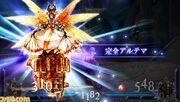
Ultima.
Ultima appears as a summon whose Eschaton will grant Stage Bravery to the player after being struck by a EX Break or Assist Break for a short period of time.
She can be purchased at the special Moogle Shop at Cornelia for 150 KP. This summonstone is unlocked at the shop as a limited offer after earning 1,800 KP total. It is stated only in this game that Ultima is half-humanoid and half-machine. This would mean that the cannon which Ultima appears to be sitting on is the lower half of her body.
Dissidia Final Fantasy Opera Omnia
Ultima appears as the final boss of Chapter 10 - Abandoned Petalum, after being summoned by Vayne
Theatrhythm Final Fantasy Curtain Call
Ultima appears in her humanoid Final Fantasy Tactics form as an enemy in Battle Music Sequences.
Pictlogica Final Fantasy
Ultima in her humanoid form appears as a boss.
Final Fantasy Airborne Brigade
Final Fantasy Artniks
Ultima appears as an obtainable card.
Final Fantasy Brave Exvius
Mobius Final Fantasy
Ultima appears as a light-element ability card and as an enemy boss summoned by Meia. She also appears as an Ability Card, though this is Earth element, unlike normally being Light-element. This ability card gives the Mage ability Fatal Stonega, an area of effect Earth attack that lowers resistance to critical hits. The Ultima Sicarius ability card is available for all classes, dealing Light damage to a single target.
Final Fantasy Trading Card Game
Ultima appears in her official Final Fantasy XII render and her Theatrhythm Final Fantasy artwork. Her cards are Shine-elemental reflecting her holy nature.
Gallery
Etymology
Ultima means "the last" in Latin and many Latin-based languages. The word is an inflection of ultimus which is the superlative of ulter, which means "that is beyond". In the Spanish versions of many Final Fantasy games, the spell Ultima's name is written as "Artema", a close transliteration of the Japanese katakana.
Ultima is referred to as the Kanya Ascendant, which is the Sanskrit name of its zodiac sign as used in Jyotish astrology. The name of Ultima's trademark attack, Eschaton, refers to the end of the world. It is from this term that the word "Eschatology" is taken, a branch of theology that refers to the study of end times.

